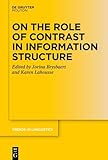On the Role of Contrast in Information Structure / ed. by Jorina Brysbaert, Karen Lahousse.
Material type: TextSeries: Trends in Linguistics. Studies and Monographs [TiLSM] ; 382Publisher: Berlin ; Boston : De Gruyter Mouton, [2024]Copyright date: 2024Description: 1 online resource (VI, 264 p.)Content type:
TextSeries: Trends in Linguistics. Studies and Monographs [TiLSM] ; 382Publisher: Berlin ; Boston : De Gruyter Mouton, [2024]Copyright date: 2024Description: 1 online resource (VI, 264 p.)Content type: - 9783110997897
- 9783110986617
- 9783110986594
- 410 23/eng/20240531
- P134 .O5 2024
- online - DeGruyter
- Issued also in print.
| Item type | Current library | Call number | URL | Status | Notes | Barcode | |
|---|---|---|---|---|---|---|---|
 eBook
eBook
|
Biblioteca "Angelicum" Pont. Univ. S.Tommaso d'Aquino Nuvola online | online - DeGruyter (Browse shelf(Opens below)) | Online access | Not for loan (Accesso limitato) | Accesso per gli utenti autorizzati / Access for authorized users | (dgr)9783110986594 |
Frontmatter -- Contents -- 1 The complex nature of contrast -- Part I: Contrast versus topic and focus -- 2 Experimental testing of focus fronting in British English -- 3 Contrast and left dislocations: Contrastive discourse relations beyond contrastive topics -- 4 Contrast and topics: An enquiry into Hindi particle -to -- Part II: Different types of contrast -- 5 Mirativity, obviousness, and reversal as instances of contrast on different levels of meaning: Evidence from Spanish intonation -- 6 Contrast via information structure: On topic development with German aber in post-initial position -- 7 Definition of contrast in spoken and signed data: An overview -- Part III: Analyzing contrast using the Question Under Discussion model -- 8 Contrast in a QUD-based informationstructure model -- 9 Contrast, concession, and QUD-trees -- Subject index
restricted access online access with authorization star
http://purl.org/coar/access_right/c_16ec
In research on Information Structure, there is an ongoing discussion about the role of contrast.While most linguists consider contrast to be compatible with both focus and topic, some argue that it is an autonomous IS category. Contrast has been shown to be encoded by different linguistic means, such as specific morphemes, adverbials, clefts, prosodic cues. Hence, this concept is also related to other domains, in particular morphosyntax and prosody. The precise way in which they interact is however not yet entirely clear. Moreover, from a methodological point of view, the identification and annotation of contrast in corpora is not straightforward.This volume provides a selection of articles discussing the definition of contrast, the importance of distinguishing different types of contrast, the use of several encoding strategies, and the annotation of contrast in corpora using the Question Under Discussion Model. The contributions offer data on English, French, French Belgian Sign Language, German, Hindi, Italian and Spanish.
Issued also in print.
Mode of access: Internet via World Wide Web.
In English.
Description based on online resource; title from PDF title page (publisher's Web site, viewed 20. Nov 2024)


